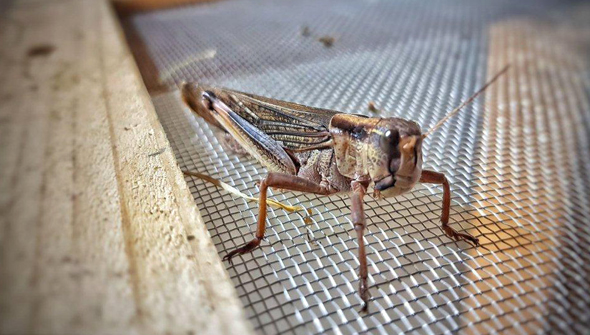Meet the 10 Finalists of Calcalist’s Foodtech Innovation Competition
Israeli food processing company Tnuva will join Calcalist on Wednesday to announce the winners of the competition
18:2906.08.18
On Wednesday, Calcalist, together with Israeli food processing company Tnuva and accounting firm KPMG, will announce the winner in a food innovation competition for Israeli startups. Dozens of Israeli foodtech companies participated in the competition, and will present their technology at Wednesday’s event, which will be held at Tel Aviv coworking space Labs.
 Grasshopper. Photo: Hargol FoodTech 2. Hargol FoodTech. Israeli startup Hargol FoodTech is looking to revolutionize the food industry by introducing commercial grasshopper farming. Grasshoppers contain 70% lean protein and have a neutral flavor, making them an ideal protein additive to a variety of foods, and an environmentally-friendly substitute to traditional protein sources such as beef, chicken, and fish. Global demand for meat is projected to double by 2050, according to the U.N. Food and Agriculture Organization website. The farming of bugs such as crickets, mealworms, and grasshoppers for food is hailed for low water footprint, low greenhouse gases emission, nearly zero waste, and the limited space it requires. More than other bugs, grasshoppers’ natural tendency to swarm makes them ideal for farming in large quantities.
Grasshopper. Photo: Hargol FoodTech 2. Hargol FoodTech. Israeli startup Hargol FoodTech is looking to revolutionize the food industry by introducing commercial grasshopper farming. Grasshoppers contain 70% lean protein and have a neutral flavor, making them an ideal protein additive to a variety of foods, and an environmentally-friendly substitute to traditional protein sources such as beef, chicken, and fish. Global demand for meat is projected to double by 2050, according to the U.N. Food and Agriculture Organization website. The farming of bugs such as crickets, mealworms, and grasshoppers for food is hailed for low water footprint, low greenhouse gases emission, nearly zero waste, and the limited space it requires. More than other bugs, grasshoppers’ natural tendency to swarm makes them ideal for farming in large quantities.
 Future Meat Technologies' Yaakov Nahmias. Photo: PR
Future Meat Technologies' Yaakov Nahmias. Photo: PR
Here are the 10 finalists:
1. Jet-Eat. Founded in 2018 and based in Tel Aviv, Jet-Eat is developing a technology that will allow people to 3D print food. Jet-Eat’s technology, software, and formulations can produce plant-based food products that look, taste, and feel like meat, and could be cooked just like meat. Jet-Eat report successful experiments in food printing and is now developing a 3D food printer for commercial use.
 Grasshopper. Photo: Hargol FoodTech
Grasshopper. Photo: Hargol FoodTech
3. Greenbox wants to revolutionize food logistics and supply network for food processing facilities and catering services.
4. Bioharvest. Headquartered in the Weizman Technology Park in central Israel, BioHarvest Ltd. manufactures health supplements from cultured fruit cells. The company’s flagship product, VINIA, is a red grape powder used to treat high blood pressure and elevated levels of triglycerides and cholesterol in the blood.
5. Crazy S.O.B’s app uses natural language processing to extract recipes from various online media sources and parse them out into smart shopping lists, matching the lists with ingredients from nearby stores.
6. Innovopro develops a technology for extracting concentrated protein from chickpeas. The company's chickpea-based 70% protein concentrate is a non-GMO, sustainable, and affordable vegan alternative to meat.
7. Valentis Nanotech Ltd. develops smart cellulose-based materials for food packaging. The company’s packaging solutions are biodegradable.
8. Timeless Foods Technologies Ltd. develops an innovative vacuum food packaging disposable plastic container for fragile baked food items such as pizza and pastry.
 Future Meat Technologies' Yaakov Nahmias. Photo: PR
Future Meat Technologies' Yaakov Nahmias. Photo: PR 9. Future Meat Technologies Ltd. Jerusalem-based lab-produced meat startup Future Meat Technologies Ltd. recently raised a $2.2 million seed investment led by Tyson Ventures, the venture capital arm of American food corporation Tyson Foods, Inc. The company is developing a manufacturing platform for the production of meat products directly from animal cells. Sprung from research conducted at the Hebrew University of Jerusalem, the company is set to launch its first line of meat products by 2020.
10. Yarok Microbio. Jerusalem-based Yarok Microbio has developed a technology that flash-tests foods for bacterial contamination including E. coli, listeria, and salmonella. Traditional bacterial testing can take days to complete, and even most existing rapid tests require up to 32 hours, according to the company. Yarok’s system provides results within 45 minutes and up to several hours, reducing recalls, and helping to protect consumers against foodborne illnesses.



